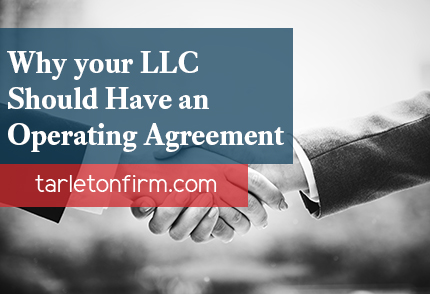Optimism Isn’t Enough
New business partners often have a shared optimism that gives them the willingness to take on the risks associated with creating a business from scratch. They can envision their new business achieving each milestone toward profitability and defeating every hurdle. After the entity is formed, any further formalities feel like an unnecessary obstacle to getting the business up and running. After all, why document how to split profits or divide duties when that has already been discussed and agreed upon in an email? We all get along now (when the business isn’t worth much), so why wouldn’t we agree in the future (when the business is valuable)?
Whether your business is a startup or has been operating for many years, there is a potential for a disagreement to arise among the owners (called “members” in an LLC). Operating a business together will required the owners to decide upon many important issues:
- How will profits be divided and distributed?
- Who will manage the LLC?
- What tax elections will the LLC make?
- What happens if a founding member dies?
- What happens if a founding member gets divorced?
- How do disagreements among members get resolved?
- What will happen (and who gets to decide) if the LLC wants to expand or go into a new business?
- How can new members be added in the future?
- How would the LLC raise supplemental working capital in the future (whether from existing members or by accepting new investors)?
- If the LLC is dissolved, how will LLC assets be distributed after liabilities are paid?
Using a free form off the internet or a form provided by your accountant is not the right way to address these questions. They should be detailed in a binding governing document called an Operating Agreement that is prepared by an attorney.
Differences of opinion among business owners are bound to occur. When that happens without an Operating Agreement, far more legal fees will likely be involved as the owners sort through years of emails to argue or litigate about important deal terms that everyone thought were already agreed upon and final. Having an Operating Agreement from the outset can help provide a framework for resolving disagreements, and owners will have a clearer understanding of the deal they have made if they force themselves to go through a formal process to create or amend written rules.
An Operating Agreement also helps with the personal liability shield provided by the LLC. Forming an LLC by filing a Certificate of Formation with the state gets things started, but it does not guarantee that the LLC will protect the members from personal liability. If an LLC faces a lawsuit, courts can disregard the existence of the LLC if sufficient evidence exists to show that the owners of the business failed to keep the business operations separate from personal assets. The safest practice is to create an operating agreement with formal rules for how the owners run the business, and then follow those rules and periodically document significant business actions and events with company resolutions and meetings. This will allow the LLC members to show a court that the business was, in fact, operating as an independent entity.
For more information, contact us at info@tarletonfirm.com or at (214) 935-9004. We are located in Dallas, but serve clients all over Texas.
This article is intended for general information purposes only. It does not constitute legal advice or create an attorney-client relationship. If you have questions about your individual circumstances, you should consult with a qualified Texas attorney to determine how applicable laws apply.

